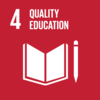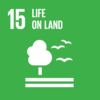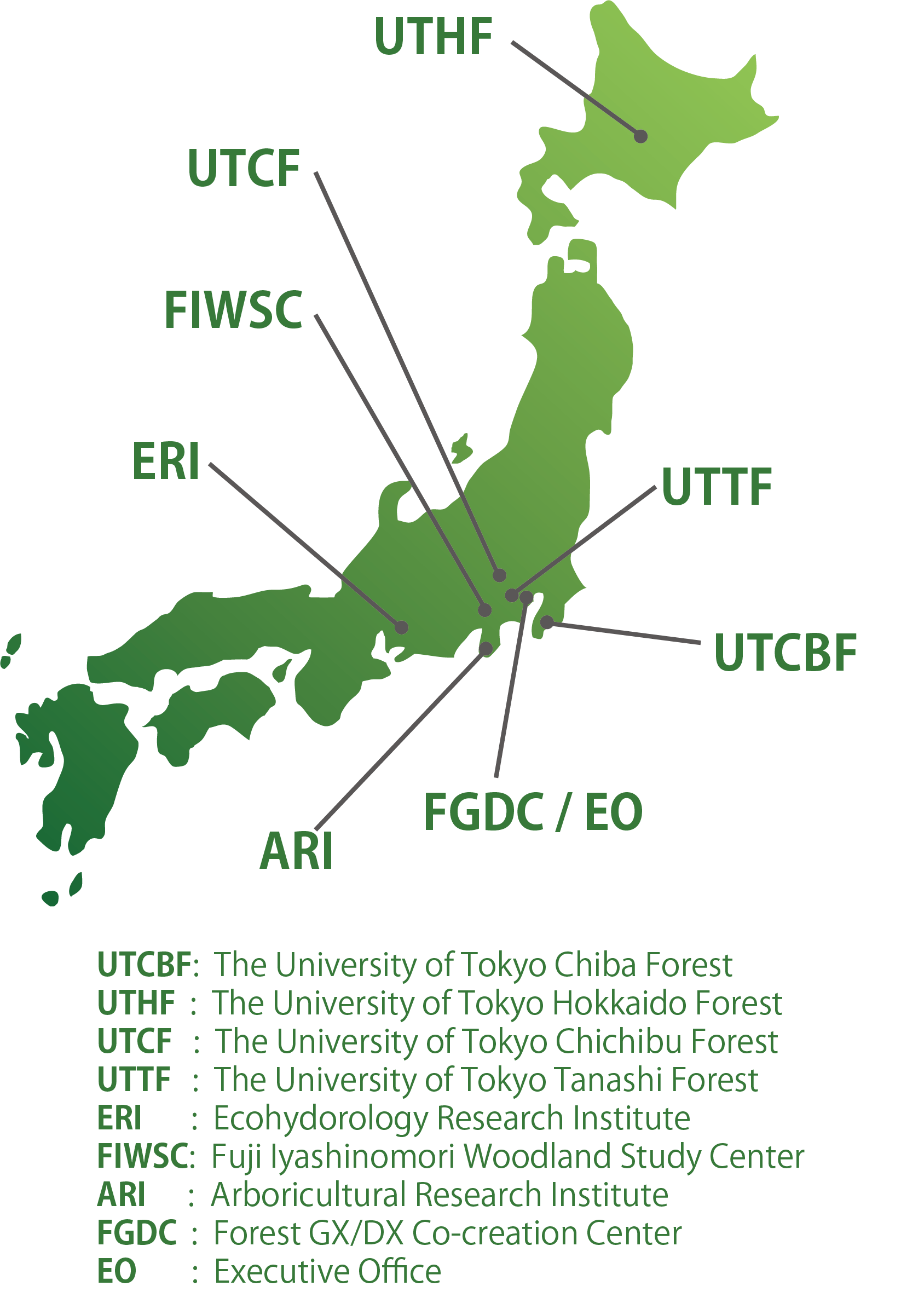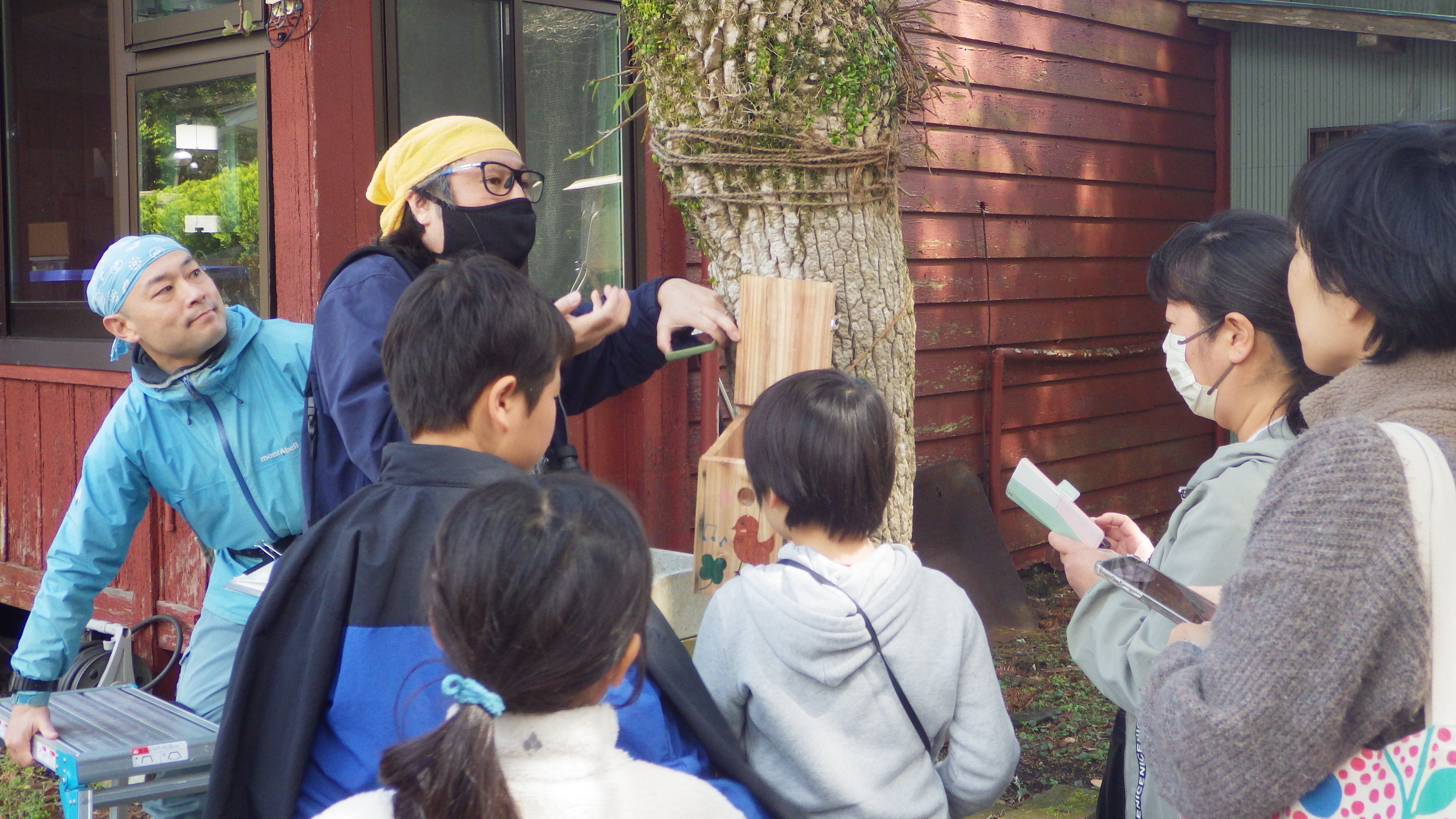The University of Tokyo Forests and local communities


Haruo Saito
Graduate School of Agricultural and Life Sciences
The University of Tokyo Forests (UTFs) is established as a facility necessary for education and research in departments related to forestry in accordance with the Standards for the Establishment of Universities, and has three missions: education, research, and extension. In education, UTFs aim to provide forest-related education at the undergraduate and graduate levels, as well as to provide the best possible field for such education.Our research aims to promote specialized research on the natural environment, particularly forests, and the relationship between forests and people, and to provide optimal fields and records (data) on the dynamics of the natural environment to research organizations such as universities. In social cooperation, UTFs aim to provide frameworks and fields to enrich various types of education in societies, including school education and lifelong education.
UTFs have been creating, preserving, and managing diverse forests for education and research for more than 100 years. As a result, many plants and animals have lived in our forests and a rich natural environment has been maintained. At the same time, the blessings of the forests have indirectly affected local communities. Rain that falls in the forests is stored in "green dams" and slowly flows out into rivers to enrich downstream communities. The wood resources are shipped to the local community and consumed as wood products. In this way, UTFs have contributed to water source recharge, national disaster prevention, and local economies, as well as preserving the natural environment and landscape.
In recent years, more and more people have become aware of the natural environment, and in addition to research and education as a university, we have added the sharing of the knowledge and technology we have cultivated with society as one of the missions of UTFs. Therefore, we are currently making efforts to actively contribute to society through social education and public relations activities. We are working daily to further develop forest science and to give back to society, so that people and nature can coexist in harmony into the future.
The social cooperation projects of UTFs are classified into the following three categories, all of which include elements of community cooperation.
(1) Social and Lifelong Education
UTFs conduct a wide range of environmental education programs in response to the growing interest in ecosystems and biodiversity. We are promoting and organizing outdoor education, which is becoming increasingly important in today's information society. In outdoor education, we offer a variety of public lectures on forests for local elementary and junior high school students and the general public. These include training courses for supporters (volunteers), providing opportunities for lifelong education. In addition, we conduct a variety of other activities, such as cooperating with integrated learning courses at elementary and junior high schools, and holding lectures on forest education for elementary, junior high, and high school teachers.
(2) Building mutually beneficial relationships with local communities
Each local forests of UTFs have established mutually beneficial relationships with local communities. These relationships range from economic to lifelong education. For example, the Hokkaido Forest produces lumber. While this contributes to stabilizing the availability of raw materials for local lumber mills, the presence of lumber mills has also made it possible to experiment with the “stand-based forest management system”. In addition, several forests have concluded exchange agreements with local municipalities and hold public lectures based on these agreements. This is intended to enhance citizen participation in forest management and citizen education.
*List of municipalities that have concluded cooperation and collaboration agreements with local forests of UTFs (as of February 26, 2024)
Chiba Forest and Kamogawa City, Chiba Prefecture
Chiba Forest and Kimitsu City, Chiba Prefecture
Hokkaido Forest and Furano City, Hokkaido
Ecohydrology Research Institute and Seto City, Aichi Prefecture
Ecohydrology Research Institute and Inuyama City, Aichi
Ecohydrology Research Institute and Kosai City, Shizuoka Prefecture (Agreement concluded with the Graduate School of Agricultural and Life Sciences)
Fuji Iyashinomori Woodland Study Center and Yamanakako Village, Yamanashi Prefecture
Arboricultural Research Institute and Minamiizu Town, Shizuoka Prefecture (Agreement concluded with the Graduate School of Agricultural and Life Sciences)
Chichibu Forest and Chichibu City, Saitama Prefecture
(3) Information and Communication
UTFs publish a biannual newsletter, "morikara", a pamphlet outlining each local forest, and annual reports to inform many people about our activities. In addition, The University of Tokyo Forests Press publishes and sells books that introduce the creatures living in our forests and the history of education and research. The website provides a wide range of information, including information published in the newsletter, information on events and seminars at UTFs, and the latest research topics. Each local forest website publishes useful information for local users, and also provides up-to-date information via SNS.
UTFs have been creating, preserving, and managing diverse forests for education and research for more than 100 years. As a result, many plants and animals have lived in our forests and a rich natural environment has been maintained. At the same time, the blessings of the forests have indirectly affected local communities. Rain that falls in the forests is stored in "green dams" and slowly flows out into rivers to enrich downstream communities. The wood resources are shipped to the local community and consumed as wood products. In this way, UTFs have contributed to water source recharge, national disaster prevention, and local economies, as well as preserving the natural environment and landscape.
In recent years, more and more people have become aware of the natural environment, and in addition to research and education as a university, we have added the sharing of the knowledge and technology we have cultivated with society as one of the missions of UTFs. Therefore, we are currently making efforts to actively contribute to society through social education and public relations activities. We are working daily to further develop forest science and to give back to society, so that people and nature can coexist in harmony into the future.
The social cooperation projects of UTFs are classified into the following three categories, all of which include elements of community cooperation.
(1) Social and Lifelong Education
UTFs conduct a wide range of environmental education programs in response to the growing interest in ecosystems and biodiversity. We are promoting and organizing outdoor education, which is becoming increasingly important in today's information society. In outdoor education, we offer a variety of public lectures on forests for local elementary and junior high school students and the general public. These include training courses for supporters (volunteers), providing opportunities for lifelong education. In addition, we conduct a variety of other activities, such as cooperating with integrated learning courses at elementary and junior high schools, and holding lectures on forest education for elementary, junior high, and high school teachers.
(2) Building mutually beneficial relationships with local communities
Each local forests of UTFs have established mutually beneficial relationships with local communities. These relationships range from economic to lifelong education. For example, the Hokkaido Forest produces lumber. While this contributes to stabilizing the availability of raw materials for local lumber mills, the presence of lumber mills has also made it possible to experiment with the “stand-based forest management system”. In addition, several forests have concluded exchange agreements with local municipalities and hold public lectures based on these agreements. This is intended to enhance citizen participation in forest management and citizen education.
*List of municipalities that have concluded cooperation and collaboration agreements with local forests of UTFs (as of February 26, 2024)
Chiba Forest and Kamogawa City, Chiba Prefecture
Chiba Forest and Kimitsu City, Chiba Prefecture
Hokkaido Forest and Furano City, Hokkaido
Ecohydrology Research Institute and Seto City, Aichi Prefecture
Ecohydrology Research Institute and Inuyama City, Aichi
Ecohydrology Research Institute and Kosai City, Shizuoka Prefecture (Agreement concluded with the Graduate School of Agricultural and Life Sciences)
Fuji Iyashinomori Woodland Study Center and Yamanakako Village, Yamanashi Prefecture
Arboricultural Research Institute and Minamiizu Town, Shizuoka Prefecture (Agreement concluded with the Graduate School of Agricultural and Life Sciences)
Chichibu Forest and Chichibu City, Saitama Prefecture
(3) Information and Communication
UTFs publish a biannual newsletter, "morikara", a pamphlet outlining each local forest, and annual reports to inform many people about our activities. In addition, The University of Tokyo Forests Press publishes and sells books that introduce the creatures living in our forests and the history of education and research. The website provides a wide range of information, including information published in the newsletter, information on events and seminars at UTFs, and the latest research topics. Each local forest website publishes useful information for local users, and also provides up-to-date information via SNS.
Related links
Related publications
“Mori-tabi”“ Tokyo Daigaku Ensyurin no midokoro 100 “Mori-tabi”“ A hundred highlights to visit and see in the University of Tokyo Forests. The University of Tokyo Forests Press, 2012, 106 pp.
Developing a network of long-term research field stations to monitor environmental changes and ecosystem responses in Asian forests KAMATA N, KURAJI K, OWARI T, GUAN BT (eds), The University of Tokyo Forests Press, 2019, 282 pp.
Developing a network of long-term research field stations to monitor environmental changes and ecosystem responses in Asian forests KAMATA N, KURAJI K, OWARI T, GUAN BT (eds), The University of Tokyo Forests Press, 2019, 282 pp.
Contact
- Email: uf-toiawase[at]uf.a.u-tokyo.ac.jp
※[at]=@













